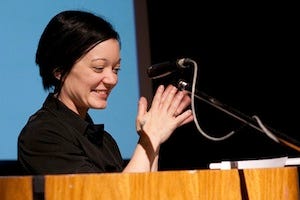The Wikimedia Foundation is Losing its Chief. What Happens Next?
Big news in the world of Wikipedia, yesterday: Sue Gardner, the executive director of the Wikimedia Foundation (the non-profit behind Wikipedia and other wiki-based projects) announced she will be stepping down from the role, which she has held since June 2007. Gardner, in a post on the Wikimedia blog:
I feel that although [Wikipedia is] in good shape, with a promising future, the same is not true for the internet itself. (This is thing number two.) Increasingly, I’m finding myself uncomfortable about how the internet’s developing, who’s influencing its development, and who is not. Last year we at Wikimedia raised an alarm about SOPA/PIPA, and now CISPA is back. Wikipedia has experienced censorship at the hands of industry groups and governments, and we are –increasingly, I think– seeing important decisions made by unaccountable, non-transparent corporate players, a shift from
the open web to mobile walled gardens, and a shift from the production-based internet to one that’s consumption-based. There are many organizations and individuals advocating for the public interest online — what’s good for ordinary people — but other interests are more numerous and powerful than they are. I want that to change. And that’s what I want to do next.
In January 2012, you may remember that Wikipedia went into "blackout" mode for 24 hours in protest of legislation before the U.S. Congress (SOPA/PIPA), so this explains that much. The rest of the statement is a little harder to puzzle out; the "non-transparent corporate players" in those circumstances were opposed by other corporate players, and both were fighting over government regulations. The line about "mobile walled gardens" sounds like Facebook, and a "consumption-based" Internet sounds like a jab at tablets, of all things, but I suppose we'll have to see. These are obviously broad statements, and Gardner hasn't actually announced her next move.
The move won't be happening too soon, yet: Gardner will be in the position for (at least) another six months, while she works with Wikipedia's Board of Trustees to find a successor, she writes in the post.
Whether Wikipedia is really "in good shape" is a matter for debate, especially considering Gardner had made a personal cause of trying to fix Wikipedia's absurd gender imbalance, not to mention the overall downward drift in editor retention and activity.
She also leaves with some organizational questions unresolved: just last October, the board approved her plan to shift and "narrow" the non-profit organization's focus to primarily software development; whereas the foundation once had "fellows" focused on community-building, the Foundation has shifted to a grant-making process, which is still making a first go of it.
Speaking of development, the great white whale continues to be what's called the VisualEditor, an editing interface intended to be much easier for users than the current system, which is fairly similar to coding HTML. (It's not as difficult as real programming, but still too much effort for most.) It's been nearly two years in the making, and has finally rolled out into testing just this year.
Speaking of whales, Sue was the first leader to follow the much better-known Jimmy Wales, who still sits on the Board of Trustees*. Gardner came from the CBC in Canada, and was not an original part of "the movement," but she came to identify with it and become quite popular with the overall Wikimedia community. It's not at all clear who should or will succeed her, but it is clear that a lot rides on the decision.
Photo licensed under Creative Commons by Ariel Kanterewicz, via Wikimedia Commons.
*This post originally stated that Wales rotates off the Board later this year; it's since been pointed out to me that, while all members' terms are limited, reappointments are allowed, which it is expected to do in Wales' case again next time.



